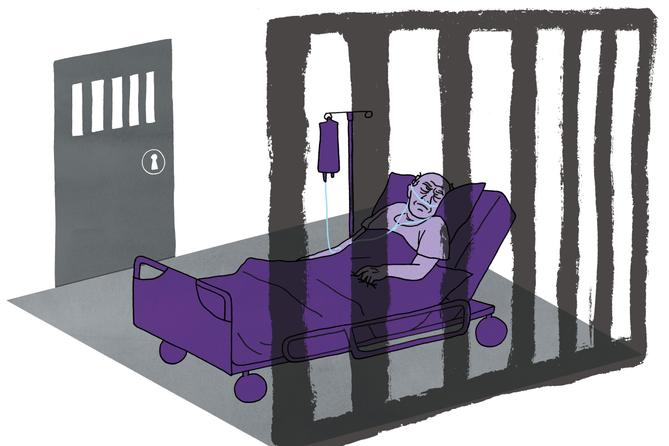Pennsylvania’s broken ‘compassionate release’ law, by the numbers
Pennsylvania’s narrow criteria for “compassionate release” has resulted in only 31 people successfully making use of the program in 13 years.

Pennsylvania’s narrow criteria for “compassionate release” has resulted in only 31 people successfully making use of the program in 13 years. (Leise Hook for Spotlight PA)
This story originally appeared on Spotlight PA.
In Pennsylvania prisons, thousands of people are aging behind bars, suffering from chronic health conditions, and requiring regular medical care that costs taxpayers millions of dollars annually. Republican and Democratic lawmakers agree the state needs a more effective way to release ailing people from prison, but have not come to a consensus.
Spotlight PA talked to 28 people serving life in prison to understand what it looks like to wait for change while growing older. Lawmakers agree the state’s current “compassionate release” law, which is written so narrowly few people qualify, needs an overhaul. But the next steps on two proposals — one permanent, one a pilot program — are uncertain.
Here are some of the most important numbers from our reporting.
Who’s behind bars
There are more than 1,900 people in Pennsylvania state prisons who are 55 or older and have served at least 25 years, one of the qualifications to apply for parole under legislation proposed by state Sen. Sharif Street (D., Philadelphia).
Of those, 80% are serving life sentences with no parole opportunities under current state law.
Of the people currently in state prison who would be eligible for geriatric release under Street’s proposed legislation, 968 are Black. That’s nearly double the number of white prisoners.
The average age of a person serving life in Pennsylvania prison is about 50.
The cost of keeping them there
People in prison are not eligible for federal health insurance programs, meaning Pennsylvania taxpayers bear the full cost of caring for incarcerated people with medical needs.
The Department of Corrections spent $2.3 billion last fiscal year to feed, house, and provide medical care for people living in Pennsylvania prisons.
$204 million, or roughly 9%, of that went to Laurel Highlands and Waymart, the state’s two prisons for people with long-term physical and mental health needs.
People with serious or chronic conditions cost more to care for on average.
The Department of Corrections spent an average of $59,598 per person last fiscal year.
But that number nearly doubled to $112,625 per person at Laurel Highlands, which houses 843 people with serious health needs.
The current system
Pennsylvania’s current compassionate release program has been on the books for 13 years.
In that time, only 31 people have successfully petitioned to leave prison because of serious illness.
Since 2016, eight people have died while waiting for a judge to hear their petition to leave prison for better medical care.
Commutation
For the 5,049 people serving life in prison, commutation is one of the only options for release. Commutations must be recommended by the five-person Board of Pardons and ultimately approved by the governor, conditions that make them rare.
The first step in the commutation process is a public hearing in front of the Board of Pardons. Only 90 people have made it to this phase during Gov. Tom Wolf’s eight years in office, and 52 have been recommended for commutation.
Wolf signed about 87% of those recommendations.
Releasing ‘juvenile lifers’
In 2017, Pennsylvania began to release “juvenile lifers,” people sentenced to life for crimes they committed when they were 17 or younger after the U.S. Supreme Court found the punishment “cruel and unusual.”
There were more than 500 juvenile lifers in Pennsylvania prisons at the time, the most of any jurisdiction in the nation.
Pennsylvania has resentenced and released 277 juvenile lifers over the past five years.
A Montclair State University study of 174 juvenile lifers released from Philadelphia prisons found only two people were convicted of new crimes after their release — one for contempt for violating a court order and the other for third-degree robbery.
 Spotlight PA is an independent, non-partisan newsroom powered by The Philadelphia Inquirer in partnership with PennLive/The Patriot-News, TribLIVE/Pittsburgh Tribune-Review, and WITF Public Media.
Spotlight PA is an independent, non-partisan newsroom powered by The Philadelphia Inquirer in partnership with PennLive/The Patriot-News, TribLIVE/Pittsburgh Tribune-Review, and WITF Public Media.
WHYY is your source for fact-based, in-depth journalism and information. As a nonprofit organization, we rely on financial support from readers like you. Please give today.






